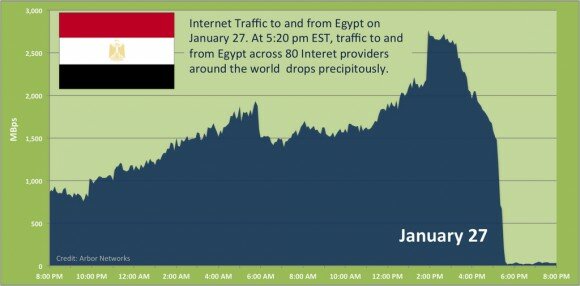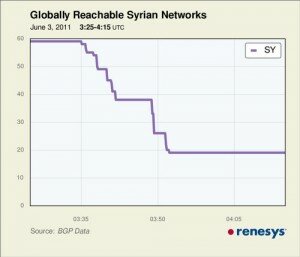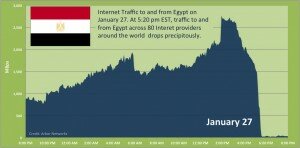

Image by Renesys
Syria shut down most of its Internet and mobile data connections early Friday, adopting a strategy used by other governments in the Middle East during critical points of the uprisings.
But the attempt to gain an advantage over the opposition groups by unplugging or partially blocking the Internet, which has played a key role in the protests, could backfire. In some cases, most notably in Egypt, the move appeared to prompt more angry protesters into the streets.
Following in the footsteps of repressive governments in Egypt and Libya, the Syrian government has dramatically escalated its conflict with protestors and opposition movements by effectively cutting them off from both each other and the international community.
This tactic has been tried before by authoritarian regimes. Some have been successful – China, for example – but most of the time it fails spectacularly.
 In January of this year, the Egyptian government severed all internet and mobile communications in the country, with some surprising results.
In January of this year, the Egyptian government severed all internet and mobile communications in the country, with some surprising results.
Google created Speak2Tweet, a service that allowed Egyptians to call a special international number and record a message for the outside world. Small World News then stepped in and began aggregating and translating those messages, resulting in our project Alive in Egypt.
Even without readily available internet access, networks can be constructed to allow the free flow of information. The policy of suppression fails; not only by re-invigorating the opposition to push back against the government, but by failing to truly silence the voices of the citizenry.
Speak2Tweet has again attempted to re-open communication by promoting a number for Syrians to use. Here’s a few examples of what’s come out in the last 24 hours:
The full impact of the Syrian government’s internet shut-down is not yet known. The suppression technique’s only real achievement is provocative headlines, thus increasing international awareness of the conflict in Syria. More than that though, it has instigated yet another leap forward in the evolution of countering such suppression tactics.
When Egypt shut down its internet, the work-arounds like Speak2Tweet were themselves revolutionary. With Syria, these tools are the norm, rapidly deployed and utilized by Syrians and the international community.
The question left for journalists, technologists, and civil society organizations is “what’s next?” How do we take these tools and build on them, enhancing their effectiveness against attacks like those of the Syrian regime? Quite simply, these oppressive techniques are nothing more than opportunities for improvement, and these opportunities must be seized.
Given that, the question raised for the Syrian regime might as well be “what have you done?” Rather than silencing the voice of opposition, the government may have, in fact, catalyzed the next wave of innovation in ensuring those voices are heard.
Blog, Featured, Small World News Blog
[...] See the original post: Syrian Voices Silenced? Not Quite | Small World News [...]
[...] Source: https://smallworldnews.tv/2011/06/03/syrian-voices-silenced-not-quite/ [...]